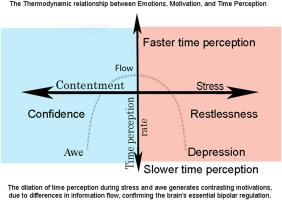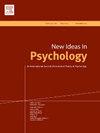感受热度:情绪、动机和时间感知的热力学视角
IF 2.9
3区 心理学
Q2 PSYCHOLOGY, EXPERIMENTAL
引用次数: 0
摘要
我们正在介绍一种新的情感热力学模型。在这个模型中,情绪被视为偏离平衡,类似于体温的波动。这种双相调节在促进智力发展的同时保持身体和心理的稳态。情绪调节通常是通过扩大一个人对时间的感知来实现的。积极的、信息含量低的情绪会降低行动驱动力,而紧张的、信息丰富的情绪会增强行动驱动力。因此,时间感知可以增强情绪的激励能力。然而,时间感知加速以促进流体动作表现,流状态代表着一种独特的满足和挑战状态。通过将心理过程锚定在能量和熵的原理上,我们的模型为理解动机和行为提供了一个全面的两极基础。除了理论意义之外,该模型还为解决由情绪失调引起的心理健康状况奠定了基础。它可以激发潜在的干预,利用我们的热力学观点所阐明的身心联系。本文章由计算机程序翻译,如有差异,请以英文原文为准。

Feeling the Heat: A Thermodynamic Perspective on Emotions, Motivation, and Time Perception
We are introducing a novel thermodynamic model of emotion. In this model, emotions are regarded as deviations from equilibrium, akin to fluctuations in body temperature. This bipolar regulation maintains bodily and psychological homeostasis while spurring mental development. Emotional regulation typically occurs through expanding one's perception of time. Positive, low-information content emotions can reduce action drive, but stressful, information-rich conditions can heighten it. Therefore, time perception can potentiate the capacity of emotions to motivate. However, time perception accelerates to facilitate fluid action performance, with the state of flow representing a unique state of contentment and challenge. By anchoring psychological processes to the principles of energy and entropy, our model offers a comprehensive bipolar foundation for understanding motivation and behavior. Beyond its theoretical implications, this model also lays the groundwork for addressing mental health conditions resulting from the dysregulation of emotions. It can inspire potential interventions to harness the mind-body connections elucidated by our thermodynamic perspective.
求助全文
通过发布文献求助,成功后即可免费获取论文全文。
去求助
来源期刊

New Ideas in Psychology
Multiple-
CiteScore
4.80
自引率
3.80%
发文量
37
期刊介绍:
New Ideas in Psychology is a journal for theoretical psychology in its broadest sense. We are looking for new and seminal ideas, from within Psychology and from other fields that have something to bring to Psychology. We welcome presentations and criticisms of theory, of background metaphysics, and of fundamental issues of method, both empirical and conceptual. We put special emphasis on the need for informed discussion of psychological theories to be interdisciplinary. Empirical papers are accepted at New Ideas in Psychology, but only as long as they focus on conceptual issues and are theoretically creative. We are also open to comments or debate, interviews, and book reviews.
 求助内容:
求助内容: 应助结果提醒方式:
应助结果提醒方式:


